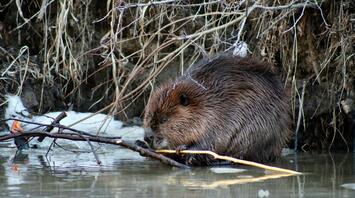An ecological project in Scotland aims to boost biodiversity, enhance tourism, and promote conservation efforts

Forestry and Land Scotland (FLS), in collaboration with the conservation charity Trees for Life, plans to reintroduce beavers to Glen Affric in spring next year. The project aims to restore a species that disappeared from Scotland nearly 400 years ago. This area, with its ancient forests, scenic lochs, and unique wildlife, is considered an ideal location for the initiative. If approved, this effort will mark another significant step in the restoration of Scotland’s natural ecosystems.
Beavers play a crucial role in enhancing ecosystems by creating wetlands that boost biodiversity and reduce flooding risks. However, earlier reintroduction attempts faced criticism from farmers concerned about potential harm to agriculture. This time, FLS conducted extensive consultations with local communities over two years to address their concerns. The final decision on the project now rests with the governmental agency NatureScot, which will assess its feasibility and impact.
Glen Affric is already a popular destination for its breathtaking landscapes, hiking trails, and opportunities for wildlife observation. The return of beavers could further attract visitors interested in conservation projects. Often called "ecosystem engineers," these animals could become a symbol of environmental restoration success. Their activity will not only enrich the area's ecological value but also enhance its appeal to eco-tourists and nature enthusiasts seeking unique experiences.
Glen Affric is part of a national nature reserve offering various hiking routes, including the well-known Affric Kintail Way. This 70-kilometer trail, stretching from Drumnadrochit to Morvich, allows hikers to enjoy stunning views of mountains, forests, and lochs. Introducing beavers to this area may further boost the trail's popularity among nature lovers. Additionally, experts predict the animals’ presence will positively influence the region's ecological balance.

The beaver reintroduction project could become a catalyst for expanding the region’s tourism offerings. Visitors will have a unique chance to observe these animals in their natural habitat while participating in eco-tourism initiatives. Educational programs highlighting the importance of biodiversity will help draw attention to conservation efforts. Such activities will not only attract new visitors but also reinforce the region’s reputation as a hub for sustainable tourism.
This initiative presents new opportunities for travelers who value nature and eco-friendly tourism. Beavers are set to become a key attraction, drawing visitors and encouraging them to choose the Scottish Highlands as a travel destination. A visit to Glen Affric will combine wildlife observation with active exploration. The restoration of this species will make the area an exceptional location for those seeking unforgettable adventures.



















